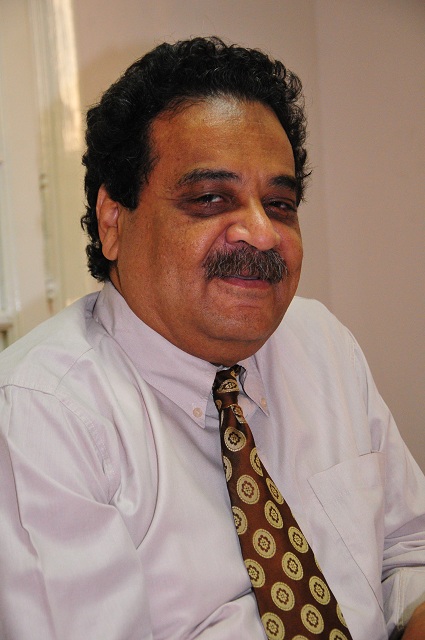 In the early days of the revolution, and since then over the last two years, my gaze has often been focused on the young Egyptian who has repeatedly climbed the lamp-posts of Tahrir Square in order to wave a flag in front of the masses.
In the early days of the revolution, and since then over the last two years, my gaze has often been focused on the young Egyptian who has repeatedly climbed the lamp-posts of Tahrir Square in order to wave a flag in front of the masses.
Because I have bad vision, whenever I go to the square, I am never sure whether the youth I see is the same one I saw climb up several hours previously, or if he has simply switched places with someone else. I usually tell myself that it is in fact the same youth, but I don’t necessarily know why I always accept this hypothesis as fact.
I’ve often asked myself how this young man is able to climb the lamp-post, and how is he is so easily able to live while perched atop it? I have so far been unable to come up with an answer, thinking maybe it has something to do with new technology used by the young generation, such as Facebook, which people of my age do not understand. Before long I stopped asking myself this question and moved onto one of more importance, which is: Will this youth ever move?
Nowadays, the first thing I do whenever I go to Tahrir Square is find the lamp-post which this youth sits atop, simply to confirm that he is still there. But why? When trying to answer this question, I realised that this youth, like thousands, if not millions of others who participated in the revolution in one way or another, had in fact nowhere else to go!
This youth is not from the upper or middle classes, the latter of whom were instrumental in launching the revolution. This youth was most likely poor, but also sly, in every sense of the word, both negative and positive. He was rough, easily able to climb up a large lamp-post and sit atop it, looking down on those below him like a stadium ceiling fan. He lived a life of poverty, but he was not broken or defeated, and had not lost his daring or desire to challenge society.
Because of all this he was not afraid to climb, and furthermore could live a life perched up high. More importantly, he has willingly thrown himself into the midst of this sea of people without fearing them. This is especially fascinating considering that now most of those in the square come from Egypt’s upper and middle classes. These youth now share the square with women and girls they would normally only see in movies, who come from neighbourhoods where, if our youth were to be seen, would surely be arrested and detained.
Our youth who has climbed this column has chosen for himself a spot that has made him the focus of everyone’s gaze, and has, to a certain extent, helped him gain an honour that he never truly possessed. Upon realising the intricacies of all of this, I said to myself: “This youth will never descend! If he did, where would he go? He didn’t come down to the square to improve his life, like those from the upper and middle class, but rather to find a life for himself, atop Tahrir.
No one had ever prepared for him a life other than that which he has so far lived, which, by most standards, was not much of a life at all. No one had ever provided him with any alternatives other than to sit atop this lamp-post.
I am convinced that this youth will never descend because he has nothing to go back to! This reminds me of a rather comic scene from the movie Sam’a Hos, when the rich singer asks the poor lawyer, “are you not scared for your office?” at which point the lawyer responds, “I would be if I had an office to be scared for”. At this point of course, the singer buys the lawyer an office, so that he does have something to fear.
If the youth does descend, it will not be to go back to his life, but rather into the heart of battle. While the country’s upper and middle classes are likely to run at the first shot of tear gas, it is this youth and those like him who will charge into battle, either on Mohamed Mahmoud Street or Qasr Al-Aini Street, at the Abbasiya or in Maspero. They will tell those upper class men, “Get out of here! You are educated and cultivated and the country needs you, leave this to us!”
However as time passed, and the actions of the third faction began to increasingly work to scare and intimidate the Egyptian people, many from the middle class began to complain that while some of the nation’s poor came to the square to sit atop its lamp-posts and defend the revolution, that many others had come merely to sell food and goods and earn a living from those in the square.
As the social makeup of the square changed so did its tactics. Whereas the square used to move to the beat of the middle class’s drum, some politicians have now attempted to make it about cross class co-operation between elements of the poor and the upper-middle class. However they have largely failed in this attempt, with clashes erupting between Egypt’s many political and socio-economic factions.
Many repeat over and over that, “there is a second revolution coming if such-and-such does not happen,” with others pointing out that the vendors and thugs have found shelter for themselves in the square.
Those from the upper middle class, who stubbornly take part in politics with a closed mind, are unaware of the 114 slums that exist throughout Cairo, and that its residents, although perhaps not as poor as a number of other African countries, live a life devoid of humanity. At the same time, they accuse the poor of not participating enough in the revolution; except as the vendors and government sponsored thugs of Tahrir Square.
These youth who sit atop the lamp-posts have no life to return to, as no one has ever provided them with an alternative. Some may try to manipulate and coerce these “ghosts”, who possess no life, for their own gain and benefit, or at least try to, however we must warn them that those who create such ghosts may not always be able to control them.
Many pretentious members of the middle class feign annoyance and disgust and refuse to recognise that what is needed to solve our current political crisis is a re-distribution not only of wealth and resources but of the social forces that make up those who participate in the revolution. Furthermore, the prevalence of poverty in our society is not merely a social issue, but a cultural one as well, one that requires a long, intense dialogue in order to address.




